Annotated Bibliography: Nutrition, Eating Behaviors, and Wellness
VerifiedAdded on 2022/08/13
|9
|2787
|13
Annotated Bibliography
AI Summary
This annotated bibliography presents summaries of ten research articles focusing on the interplay between nutrition, eating behaviors, mental health, and lifestyle factors, particularly among young adults and university students. The articles explore the associations between obesity, depression, emotional eating, and disordered eating tendencies. Several studies investigate the impact of stress, personality traits, and mindfulness on eating habits. The bibliography also examines the influence of lifestyle factors, such as urbanization and physical activity, on obesity and the prevalence of emotional eating. Furthermore, the articles discuss the connection between eating behaviors, self-esteem, and depression, as well as the role of cognitive, behavioral, and emotional aspects of eating habits. The research utilizes diverse methodologies, including surveys, questionnaires, and clinical measurements, to provide insights into the complex relationship between these variables. The bibliography highlights the strengths and limitations of each study, offering a comprehensive overview of the current research landscape in nutrition and wellness.
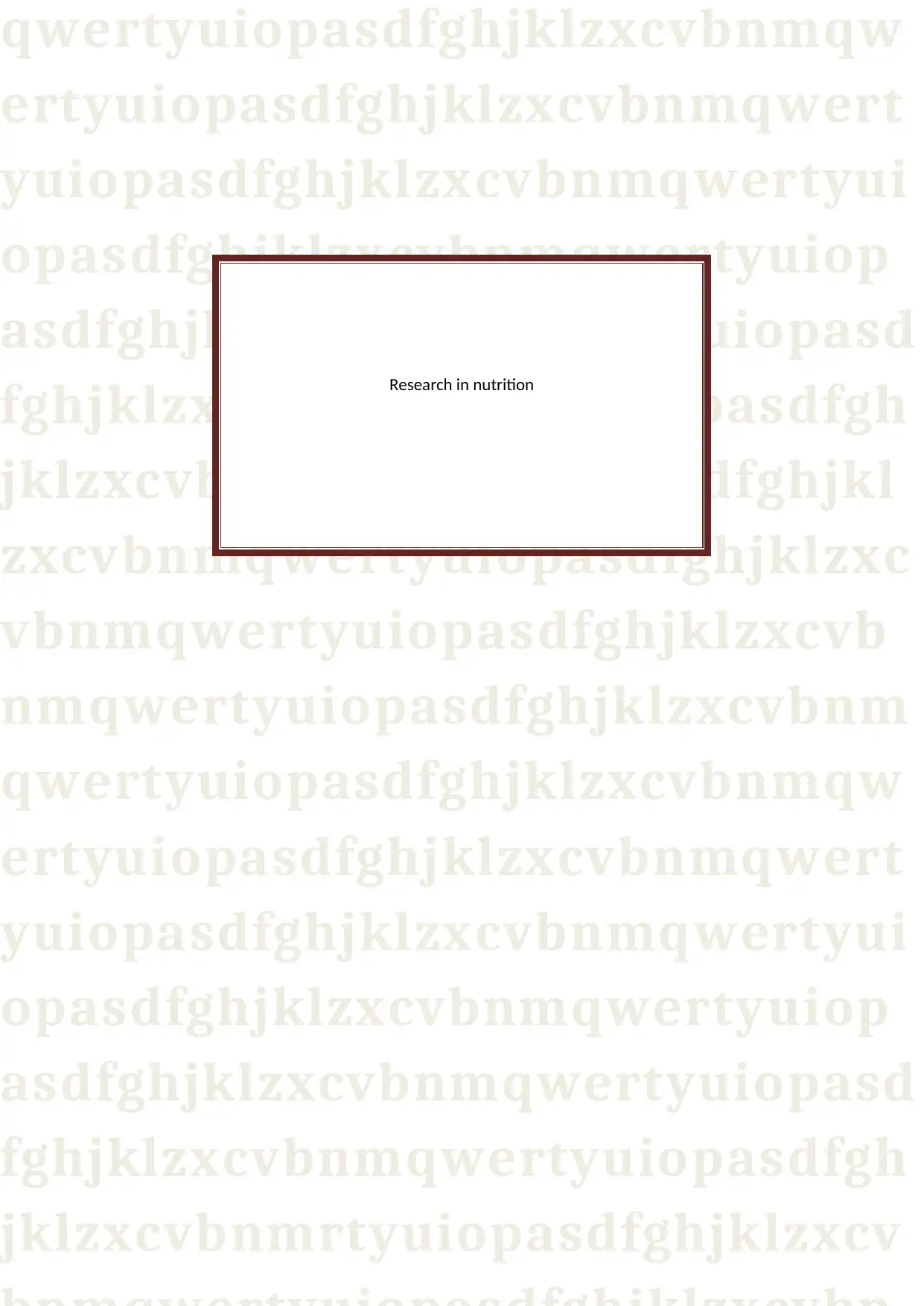
qwertyuiopasdfghjklzxcvbnmqw
ertyuiopasdfghjklzxcvbnmqwert
yuiopasdfghjklzxcvbnmqwertyui
opasdfghjklzxcvbnmqwertyuiop
asdfghjklzxcvbnmqwertyuiopasd
fghjklzxcvbnmqwertyuiopasdfgh
jklzxcvbnmqwertyuiopasdfghjkl
zxcvbnmqwertyuiopasdfghjklzxc
vbnmqwertyuiopasdfghjklzxcvb
nmqwertyuiopasdfghjklzxcvbnm
qwertyuiopasdfghjklzxcvbnmqw
ertyuiopasdfghjklzxcvbnmqwert
yuiopasdfghjklzxcvbnmqwertyui
opasdfghjklzxcvbnmqwertyuiop
asdfghjklzxcvbnmqwertyuiopasd
fghjklzxcvbnmqwertyuiopasdfgh
jklzxcvbnmrtyuiopasdfghjklzxcv
Research in nutrition
ertyuiopasdfghjklzxcvbnmqwert
yuiopasdfghjklzxcvbnmqwertyui
opasdfghjklzxcvbnmqwertyuiop
asdfghjklzxcvbnmqwertyuiopasd
fghjklzxcvbnmqwertyuiopasdfgh
jklzxcvbnmqwertyuiopasdfghjkl
zxcvbnmqwertyuiopasdfghjklzxc
vbnmqwertyuiopasdfghjklzxcvb
nmqwertyuiopasdfghjklzxcvbnm
qwertyuiopasdfghjklzxcvbnmqw
ertyuiopasdfghjklzxcvbnmqwert
yuiopasdfghjklzxcvbnmqwertyui
opasdfghjklzxcvbnmqwertyuiop
asdfghjklzxcvbnmqwertyuiopasd
fghjklzxcvbnmqwertyuiopasdfgh
jklzxcvbnmrtyuiopasdfghjklzxcv
Research in nutrition
Paraphrase This Document
Need a fresh take? Get an instant paraphrase of this document with our AI Paraphraser
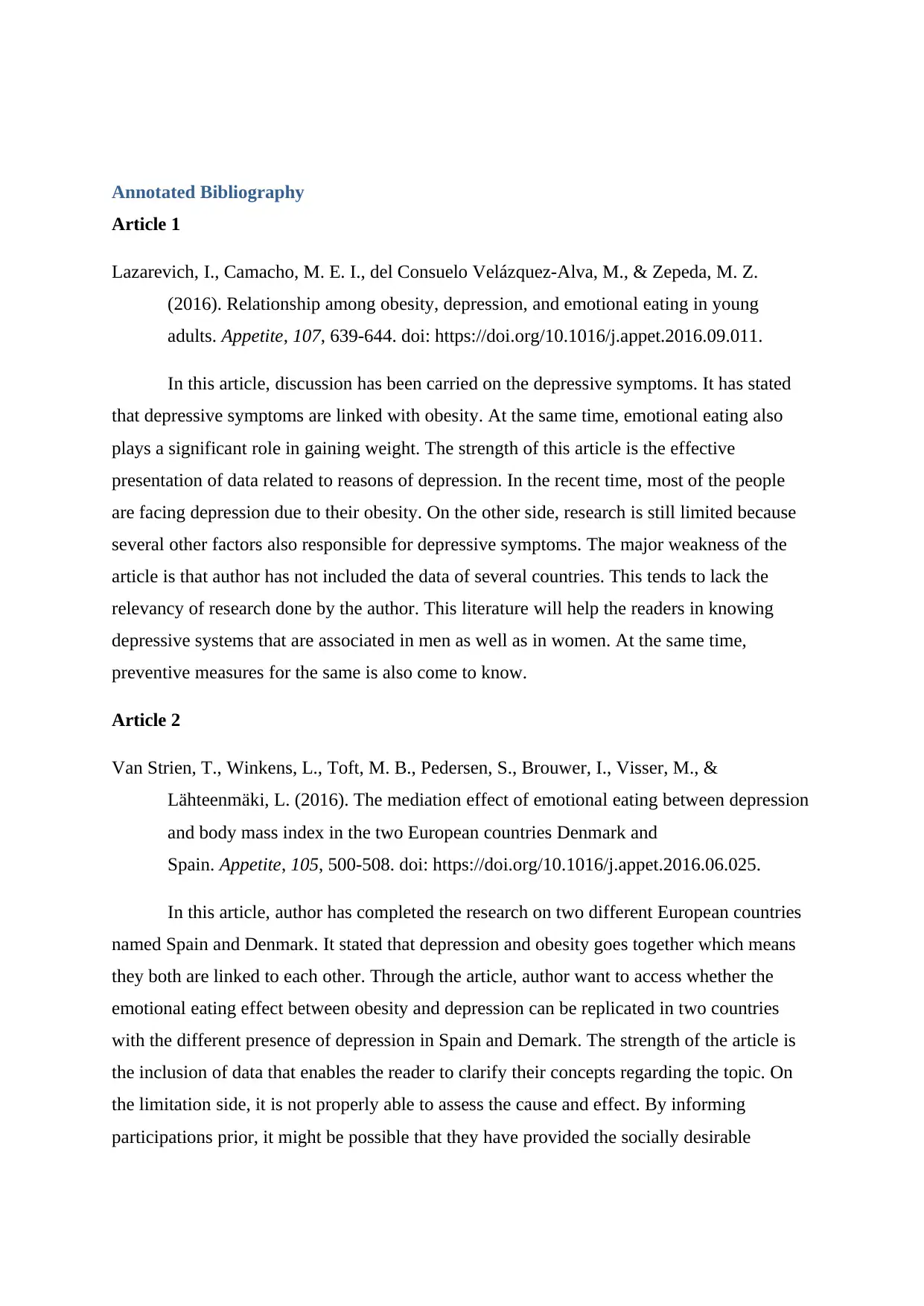
Annotated Bibliography
Article 1
Lazarevich, I., Camacho, M. E. I., del Consuelo Velázquez-Alva, M., & Zepeda, M. Z.
(2016). Relationship among obesity, depression, and emotional eating in young
adults. Appetite, 107, 639-644. doi: https://doi.org/10.1016/j.appet.2016.09.011.
In this article, discussion has been carried on the depressive symptoms. It has stated
that depressive symptoms are linked with obesity. At the same time, emotional eating also
plays a significant role in gaining weight. The strength of this article is the effective
presentation of data related to reasons of depression. In the recent time, most of the people
are facing depression due to their obesity. On the other side, research is still limited because
several other factors also responsible for depressive symptoms. The major weakness of the
article is that author has not included the data of several countries. This tends to lack the
relevancy of research done by the author. This literature will help the readers in knowing
depressive systems that are associated in men as well as in women. At the same time,
preventive measures for the same is also come to know.
Article 2
Van Strien, T., Winkens, L., Toft, M. B., Pedersen, S., Brouwer, I., Visser, M., &
Lähteenmäki, L. (2016). The mediation effect of emotional eating between depression
and body mass index in the two European countries Denmark and
Spain. Appetite, 105, 500-508. doi: https://doi.org/10.1016/j.appet.2016.06.025.
In this article, author has completed the research on two different European countries
named Spain and Denmark. It stated that depression and obesity goes together which means
they both are linked to each other. Through the article, author want to access whether the
emotional eating effect between obesity and depression can be replicated in two countries
with the different presence of depression in Spain and Demark. The strength of the article is
the inclusion of data that enables the reader to clarify their concepts regarding the topic. On
the limitation side, it is not properly able to assess the cause and effect. By informing
participations prior, it might be possible that they have provided the socially desirable
Article 1
Lazarevich, I., Camacho, M. E. I., del Consuelo Velázquez-Alva, M., & Zepeda, M. Z.
(2016). Relationship among obesity, depression, and emotional eating in young
adults. Appetite, 107, 639-644. doi: https://doi.org/10.1016/j.appet.2016.09.011.
In this article, discussion has been carried on the depressive symptoms. It has stated
that depressive symptoms are linked with obesity. At the same time, emotional eating also
plays a significant role in gaining weight. The strength of this article is the effective
presentation of data related to reasons of depression. In the recent time, most of the people
are facing depression due to their obesity. On the other side, research is still limited because
several other factors also responsible for depressive symptoms. The major weakness of the
article is that author has not included the data of several countries. This tends to lack the
relevancy of research done by the author. This literature will help the readers in knowing
depressive systems that are associated in men as well as in women. At the same time,
preventive measures for the same is also come to know.
Article 2
Van Strien, T., Winkens, L., Toft, M. B., Pedersen, S., Brouwer, I., Visser, M., &
Lähteenmäki, L. (2016). The mediation effect of emotional eating between depression
and body mass index in the two European countries Denmark and
Spain. Appetite, 105, 500-508. doi: https://doi.org/10.1016/j.appet.2016.06.025.
In this article, author has completed the research on two different European countries
named Spain and Denmark. It stated that depression and obesity goes together which means
they both are linked to each other. Through the article, author want to access whether the
emotional eating effect between obesity and depression can be replicated in two countries
with the different presence of depression in Spain and Demark. The strength of the article is
the inclusion of data that enables the reader to clarify their concepts regarding the topic. On
the limitation side, it is not properly able to assess the cause and effect. By informing
participations prior, it might be possible that they have provided the socially desirable
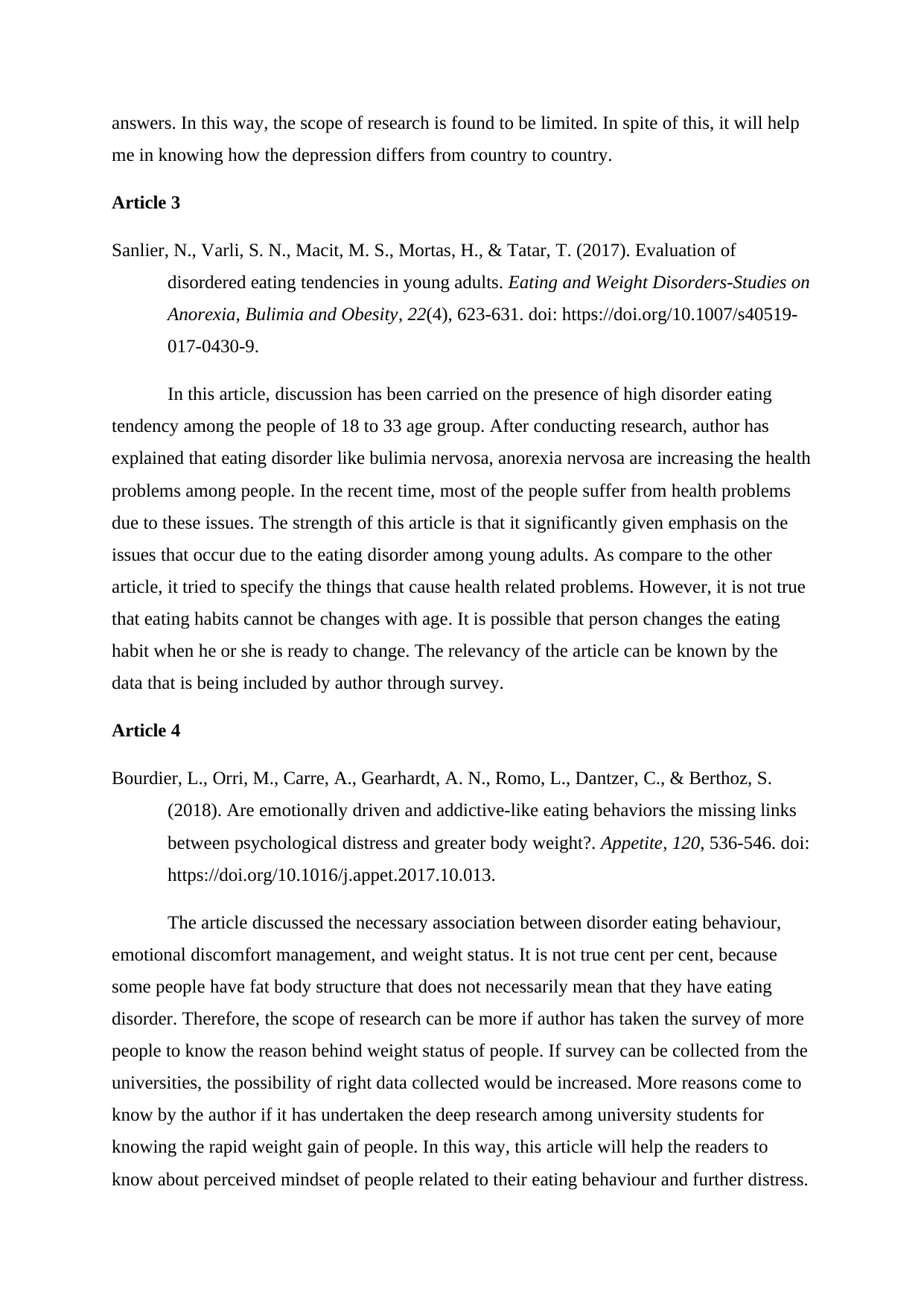
answers. In this way, the scope of research is found to be limited. In spite of this, it will help
me in knowing how the depression differs from country to country.
Article 3
Sanlier, N., Varli, S. N., Macit, M. S., Mortas, H., & Tatar, T. (2017). Evaluation of
disordered eating tendencies in young adults. Eating and Weight Disorders-Studies on
Anorexia, Bulimia and Obesity, 22(4), 623-631. doi: https://doi.org/10.1007/s40519-
017-0430-9.
In this article, discussion has been carried on the presence of high disorder eating
tendency among the people of 18 to 33 age group. After conducting research, author has
explained that eating disorder like bulimia nervosa, anorexia nervosa are increasing the health
problems among people. In the recent time, most of the people suffer from health problems
due to these issues. The strength of this article is that it significantly given emphasis on the
issues that occur due to the eating disorder among young adults. As compare to the other
article, it tried to specify the things that cause health related problems. However, it is not true
that eating habits cannot be changes with age. It is possible that person changes the eating
habit when he or she is ready to change. The relevancy of the article can be known by the
data that is being included by author through survey.
Article 4
Bourdier, L., Orri, M., Carre, A., Gearhardt, A. N., Romo, L., Dantzer, C., & Berthoz, S.
(2018). Are emotionally driven and addictive-like eating behaviors the missing links
between psychological distress and greater body weight?. Appetite, 120, 536-546. doi:
https://doi.org/10.1016/j.appet.2017.10.013.
The article discussed the necessary association between disorder eating behaviour,
emotional discomfort management, and weight status. It is not true cent per cent, because
some people have fat body structure that does not necessarily mean that they have eating
disorder. Therefore, the scope of research can be more if author has taken the survey of more
people to know the reason behind weight status of people. If survey can be collected from the
universities, the possibility of right data collected would be increased. More reasons come to
know by the author if it has undertaken the deep research among university students for
knowing the rapid weight gain of people. In this way, this article will help the readers to
know about perceived mindset of people related to their eating behaviour and further distress.
me in knowing how the depression differs from country to country.
Article 3
Sanlier, N., Varli, S. N., Macit, M. S., Mortas, H., & Tatar, T. (2017). Evaluation of
disordered eating tendencies in young adults. Eating and Weight Disorders-Studies on
Anorexia, Bulimia and Obesity, 22(4), 623-631. doi: https://doi.org/10.1007/s40519-
017-0430-9.
In this article, discussion has been carried on the presence of high disorder eating
tendency among the people of 18 to 33 age group. After conducting research, author has
explained that eating disorder like bulimia nervosa, anorexia nervosa are increasing the health
problems among people. In the recent time, most of the people suffer from health problems
due to these issues. The strength of this article is that it significantly given emphasis on the
issues that occur due to the eating disorder among young adults. As compare to the other
article, it tried to specify the things that cause health related problems. However, it is not true
that eating habits cannot be changes with age. It is possible that person changes the eating
habit when he or she is ready to change. The relevancy of the article can be known by the
data that is being included by author through survey.
Article 4
Bourdier, L., Orri, M., Carre, A., Gearhardt, A. N., Romo, L., Dantzer, C., & Berthoz, S.
(2018). Are emotionally driven and addictive-like eating behaviors the missing links
between psychological distress and greater body weight?. Appetite, 120, 536-546. doi:
https://doi.org/10.1016/j.appet.2017.10.013.
The article discussed the necessary association between disorder eating behaviour,
emotional discomfort management, and weight status. It is not true cent per cent, because
some people have fat body structure that does not necessarily mean that they have eating
disorder. Therefore, the scope of research can be more if author has taken the survey of more
people to know the reason behind weight status of people. If survey can be collected from the
universities, the possibility of right data collected would be increased. More reasons come to
know by the author if it has undertaken the deep research among university students for
knowing the rapid weight gain of people. In this way, this article will help the readers to
know about perceived mindset of people related to their eating behaviour and further distress.
⊘ This is a preview!⊘
Do you want full access?
Subscribe today to unlock all pages.

Trusted by 1+ million students worldwide
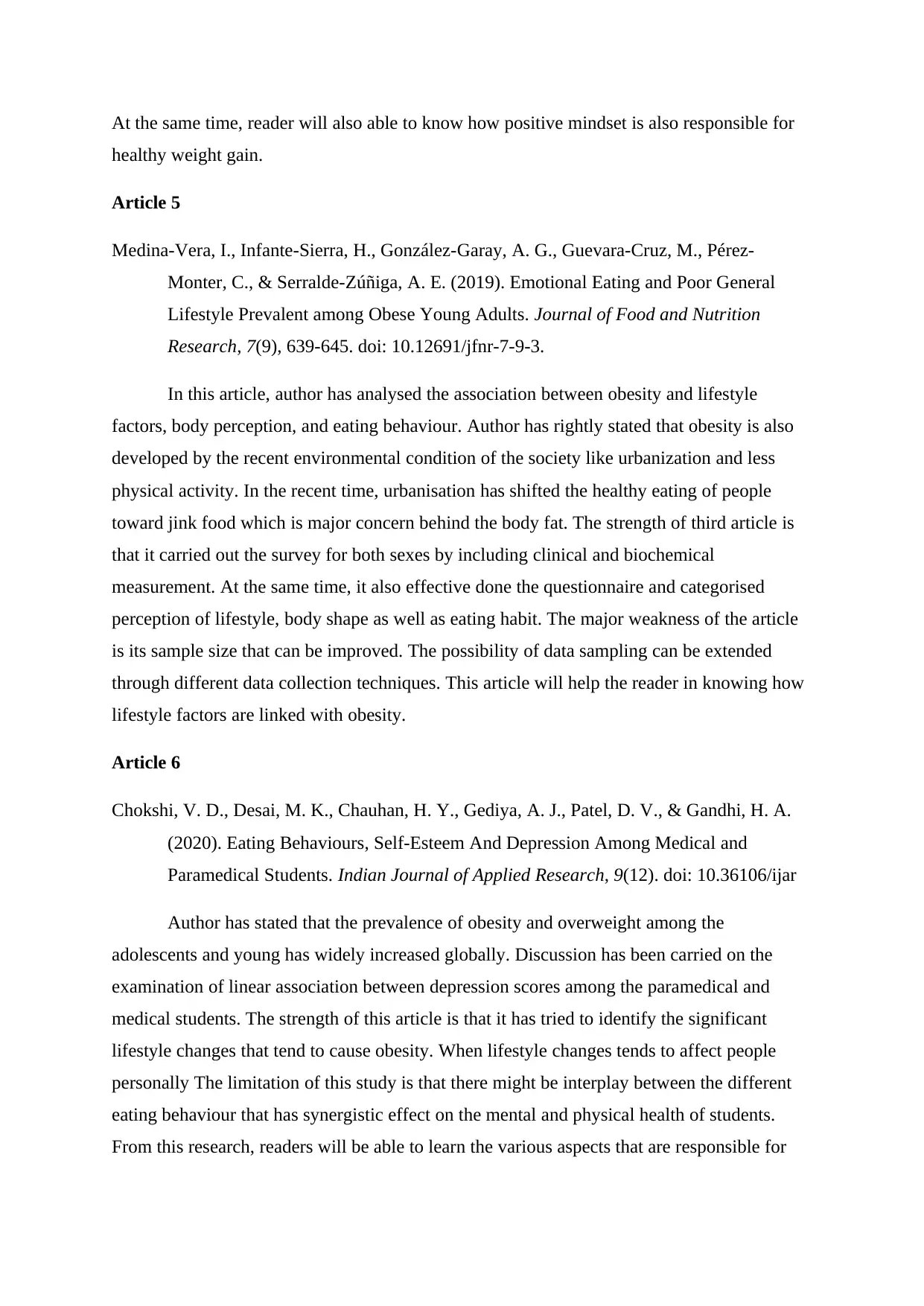
At the same time, reader will also able to know how positive mindset is also responsible for
healthy weight gain.
Article 5
Medina-Vera, I., Infante-Sierra, H., González-Garay, A. G., Guevara-Cruz, M., Pérez-
Monter, C., & Serralde-Zúñiga, A. E. (2019). Emotional Eating and Poor General
Lifestyle Prevalent among Obese Young Adults. Journal of Food and Nutrition
Research, 7(9), 639-645. doi: 10.12691/jfnr-7-9-3.
In this article, author has analysed the association between obesity and lifestyle
factors, body perception, and eating behaviour. Author has rightly stated that obesity is also
developed by the recent environmental condition of the society like urbanization and less
physical activity. In the recent time, urbanisation has shifted the healthy eating of people
toward jink food which is major concern behind the body fat. The strength of third article is
that it carried out the survey for both sexes by including clinical and biochemical
measurement. At the same time, it also effective done the questionnaire and categorised
perception of lifestyle, body shape as well as eating habit. The major weakness of the article
is its sample size that can be improved. The possibility of data sampling can be extended
through different data collection techniques. This article will help the reader in knowing how
lifestyle factors are linked with obesity.
Article 6
Chokshi, V. D., Desai, M. K., Chauhan, H. Y., Gediya, A. J., Patel, D. V., & Gandhi, H. A.
(2020). Eating Behaviours, Self-Esteem And Depression Among Medical and
Paramedical Students. Indian Journal of Applied Research, 9(12). doi: 10.36106/ijar
Author has stated that the prevalence of obesity and overweight among the
adolescents and young has widely increased globally. Discussion has been carried on the
examination of linear association between depression scores among the paramedical and
medical students. The strength of this article is that it has tried to identify the significant
lifestyle changes that tend to cause obesity. When lifestyle changes tends to affect people
personally The limitation of this study is that there might be interplay between the different
eating behaviour that has synergistic effect on the mental and physical health of students.
From this research, readers will be able to learn the various aspects that are responsible for
healthy weight gain.
Article 5
Medina-Vera, I., Infante-Sierra, H., González-Garay, A. G., Guevara-Cruz, M., Pérez-
Monter, C., & Serralde-Zúñiga, A. E. (2019). Emotional Eating and Poor General
Lifestyle Prevalent among Obese Young Adults. Journal of Food and Nutrition
Research, 7(9), 639-645. doi: 10.12691/jfnr-7-9-3.
In this article, author has analysed the association between obesity and lifestyle
factors, body perception, and eating behaviour. Author has rightly stated that obesity is also
developed by the recent environmental condition of the society like urbanization and less
physical activity. In the recent time, urbanisation has shifted the healthy eating of people
toward jink food which is major concern behind the body fat. The strength of third article is
that it carried out the survey for both sexes by including clinical and biochemical
measurement. At the same time, it also effective done the questionnaire and categorised
perception of lifestyle, body shape as well as eating habit. The major weakness of the article
is its sample size that can be improved. The possibility of data sampling can be extended
through different data collection techniques. This article will help the reader in knowing how
lifestyle factors are linked with obesity.
Article 6
Chokshi, V. D., Desai, M. K., Chauhan, H. Y., Gediya, A. J., Patel, D. V., & Gandhi, H. A.
(2020). Eating Behaviours, Self-Esteem And Depression Among Medical and
Paramedical Students. Indian Journal of Applied Research, 9(12). doi: 10.36106/ijar
Author has stated that the prevalence of obesity and overweight among the
adolescents and young has widely increased globally. Discussion has been carried on the
examination of linear association between depression scores among the paramedical and
medical students. The strength of this article is that it has tried to identify the significant
lifestyle changes that tend to cause obesity. When lifestyle changes tends to affect people
personally The limitation of this study is that there might be interplay between the different
eating behaviour that has synergistic effect on the mental and physical health of students.
From this research, readers will be able to learn the various aspects that are responsible for
Paraphrase This Document
Need a fresh take? Get an instant paraphrase of this document with our AI Paraphraser
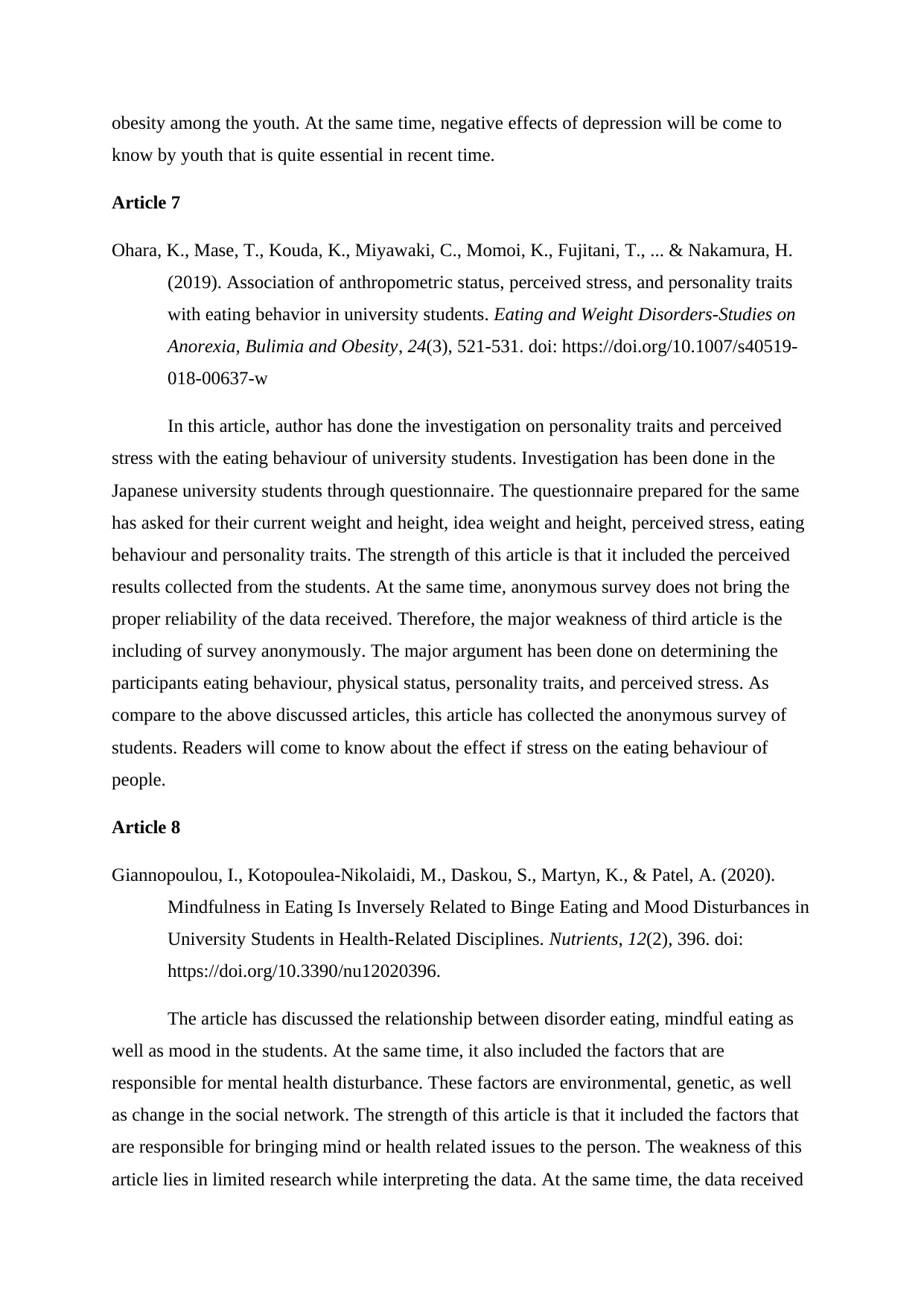
obesity among the youth. At the same time, negative effects of depression will be come to
know by youth that is quite essential in recent time.
Article 7
Ohara, K., Mase, T., Kouda, K., Miyawaki, C., Momoi, K., Fujitani, T., ... & Nakamura, H.
(2019). Association of anthropometric status, perceived stress, and personality traits
with eating behavior in university students. Eating and Weight Disorders-Studies on
Anorexia, Bulimia and Obesity, 24(3), 521-531. doi: https://doi.org/10.1007/s40519-
018-00637-w
In this article, author has done the investigation on personality traits and perceived
stress with the eating behaviour of university students. Investigation has been done in the
Japanese university students through questionnaire. The questionnaire prepared for the same
has asked for their current weight and height, idea weight and height, perceived stress, eating
behaviour and personality traits. The strength of this article is that it included the perceived
results collected from the students. At the same time, anonymous survey does not bring the
proper reliability of the data received. Therefore, the major weakness of third article is the
including of survey anonymously. The major argument has been done on determining the
participants eating behaviour, physical status, personality traits, and perceived stress. As
compare to the above discussed articles, this article has collected the anonymous survey of
students. Readers will come to know about the effect if stress on the eating behaviour of
people.
Article 8
Giannopoulou, I., Kotopoulea-Nikolaidi, M., Daskou, S., Martyn, K., & Patel, A. (2020).
Mindfulness in Eating Is Inversely Related to Binge Eating and Mood Disturbances in
University Students in Health-Related Disciplines. Nutrients, 12(2), 396. doi:
https://doi.org/10.3390/nu12020396.
The article has discussed the relationship between disorder eating, mindful eating as
well as mood in the students. At the same time, it also included the factors that are
responsible for mental health disturbance. These factors are environmental, genetic, as well
as change in the social network. The strength of this article is that it included the factors that
are responsible for bringing mind or health related issues to the person. The weakness of this
article lies in limited research while interpreting the data. At the same time, the data received
know by youth that is quite essential in recent time.
Article 7
Ohara, K., Mase, T., Kouda, K., Miyawaki, C., Momoi, K., Fujitani, T., ... & Nakamura, H.
(2019). Association of anthropometric status, perceived stress, and personality traits
with eating behavior in university students. Eating and Weight Disorders-Studies on
Anorexia, Bulimia and Obesity, 24(3), 521-531. doi: https://doi.org/10.1007/s40519-
018-00637-w
In this article, author has done the investigation on personality traits and perceived
stress with the eating behaviour of university students. Investigation has been done in the
Japanese university students through questionnaire. The questionnaire prepared for the same
has asked for their current weight and height, idea weight and height, perceived stress, eating
behaviour and personality traits. The strength of this article is that it included the perceived
results collected from the students. At the same time, anonymous survey does not bring the
proper reliability of the data received. Therefore, the major weakness of third article is the
including of survey anonymously. The major argument has been done on determining the
participants eating behaviour, physical status, personality traits, and perceived stress. As
compare to the above discussed articles, this article has collected the anonymous survey of
students. Readers will come to know about the effect if stress on the eating behaviour of
people.
Article 8
Giannopoulou, I., Kotopoulea-Nikolaidi, M., Daskou, S., Martyn, K., & Patel, A. (2020).
Mindfulness in Eating Is Inversely Related to Binge Eating and Mood Disturbances in
University Students in Health-Related Disciplines. Nutrients, 12(2), 396. doi:
https://doi.org/10.3390/nu12020396.
The article has discussed the relationship between disorder eating, mindful eating as
well as mood in the students. At the same time, it also included the factors that are
responsible for mental health disturbance. These factors are environmental, genetic, as well
as change in the social network. The strength of this article is that it included the factors that
are responsible for bringing mind or health related issues to the person. The weakness of this
article lies in limited research while interpreting the data. At the same time, the data received
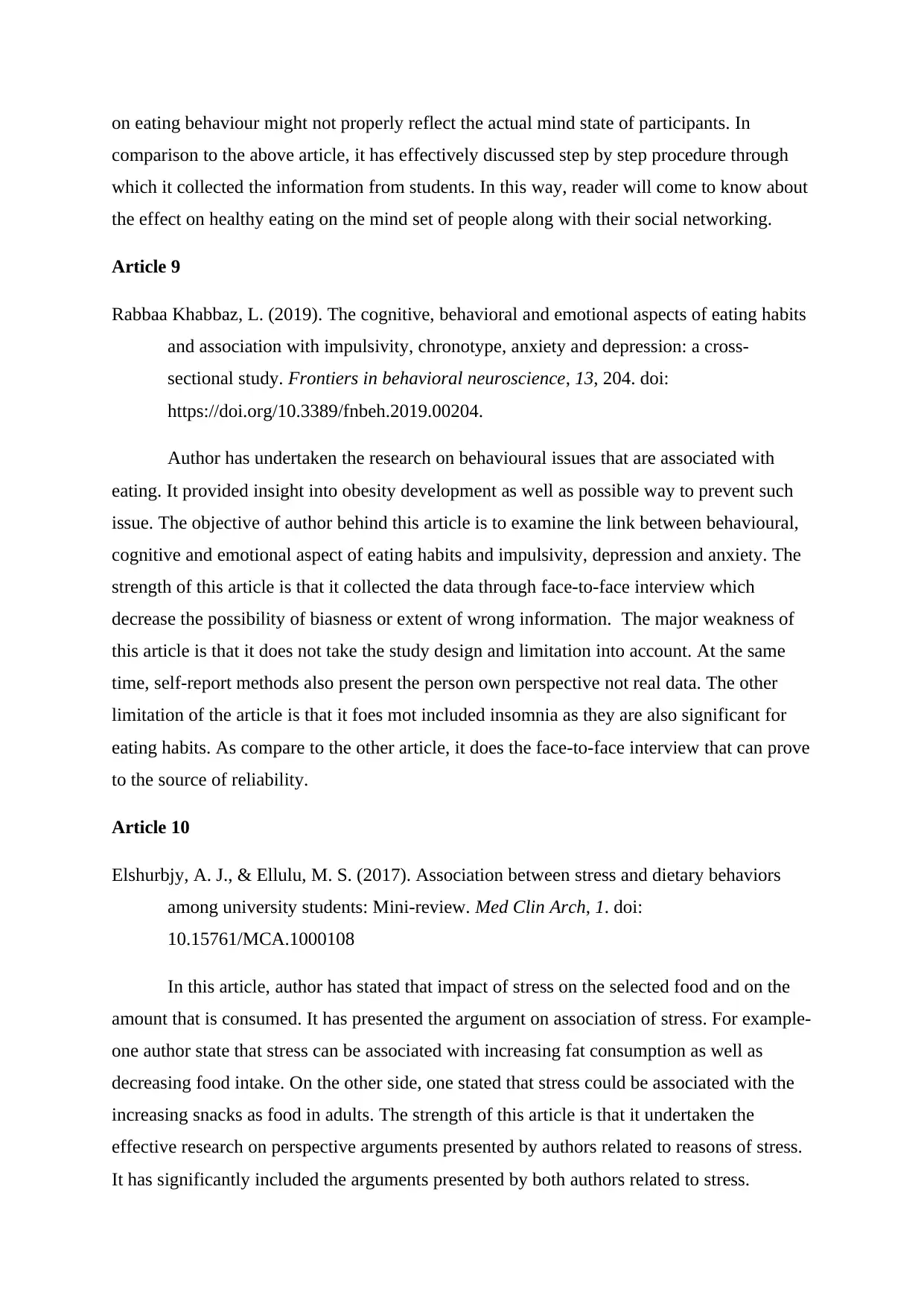
on eating behaviour might not properly reflect the actual mind state of participants. In
comparison to the above article, it has effectively discussed step by step procedure through
which it collected the information from students. In this way, reader will come to know about
the effect on healthy eating on the mind set of people along with their social networking.
Article 9
Rabbaa Khabbaz, L. (2019). The cognitive, behavioral and emotional aspects of eating habits
and association with impulsivity, chronotype, anxiety and depression: a cross-
sectional study. Frontiers in behavioral neuroscience, 13, 204. doi:
https://doi.org/10.3389/fnbeh.2019.00204.
Author has undertaken the research on behavioural issues that are associated with
eating. It provided insight into obesity development as well as possible way to prevent such
issue. The objective of author behind this article is to examine the link between behavioural,
cognitive and emotional aspect of eating habits and impulsivity, depression and anxiety. The
strength of this article is that it collected the data through face-to-face interview which
decrease the possibility of biasness or extent of wrong information. The major weakness of
this article is that it does not take the study design and limitation into account. At the same
time, self-report methods also present the person own perspective not real data. The other
limitation of the article is that it foes mot included insomnia as they are also significant for
eating habits. As compare to the other article, it does the face-to-face interview that can prove
to the source of reliability.
Article 10
Elshurbjy, A. J., & Ellulu, M. S. (2017). Association between stress and dietary behaviors
among university students: Mini-review. Med Clin Arch, 1. doi:
10.15761/MCA.1000108
In this article, author has stated that impact of stress on the selected food and on the
amount that is consumed. It has presented the argument on association of stress. For example-
one author state that stress can be associated with increasing fat consumption as well as
decreasing food intake. On the other side, one stated that stress could be associated with the
increasing snacks as food in adults. The strength of this article is that it undertaken the
effective research on perspective arguments presented by authors related to reasons of stress.
It has significantly included the arguments presented by both authors related to stress.
comparison to the above article, it has effectively discussed step by step procedure through
which it collected the information from students. In this way, reader will come to know about
the effect on healthy eating on the mind set of people along with their social networking.
Article 9
Rabbaa Khabbaz, L. (2019). The cognitive, behavioral and emotional aspects of eating habits
and association with impulsivity, chronotype, anxiety and depression: a cross-
sectional study. Frontiers in behavioral neuroscience, 13, 204. doi:
https://doi.org/10.3389/fnbeh.2019.00204.
Author has undertaken the research on behavioural issues that are associated with
eating. It provided insight into obesity development as well as possible way to prevent such
issue. The objective of author behind this article is to examine the link between behavioural,
cognitive and emotional aspect of eating habits and impulsivity, depression and anxiety. The
strength of this article is that it collected the data through face-to-face interview which
decrease the possibility of biasness or extent of wrong information. The major weakness of
this article is that it does not take the study design and limitation into account. At the same
time, self-report methods also present the person own perspective not real data. The other
limitation of the article is that it foes mot included insomnia as they are also significant for
eating habits. As compare to the other article, it does the face-to-face interview that can prove
to the source of reliability.
Article 10
Elshurbjy, A. J., & Ellulu, M. S. (2017). Association between stress and dietary behaviors
among university students: Mini-review. Med Clin Arch, 1. doi:
10.15761/MCA.1000108
In this article, author has stated that impact of stress on the selected food and on the
amount that is consumed. It has presented the argument on association of stress. For example-
one author state that stress can be associated with increasing fat consumption as well as
decreasing food intake. On the other side, one stated that stress could be associated with the
increasing snacks as food in adults. The strength of this article is that it undertaken the
effective research on perspective arguments presented by authors related to reasons of stress.
It has significantly included the arguments presented by both authors related to stress.
⊘ This is a preview!⊘
Do you want full access?
Subscribe today to unlock all pages.

Trusted by 1+ million students worldwide

However, it can also extend the research by providing ways to mitigate problem of stress
among human being. Therefore, reader will come to know how stress is linked with the
increasing fat consumption and decreasing food intake.
among human being. Therefore, reader will come to know how stress is linked with the
increasing fat consumption and decreasing food intake.
Paraphrase This Document
Need a fresh take? Get an instant paraphrase of this document with our AI Paraphraser
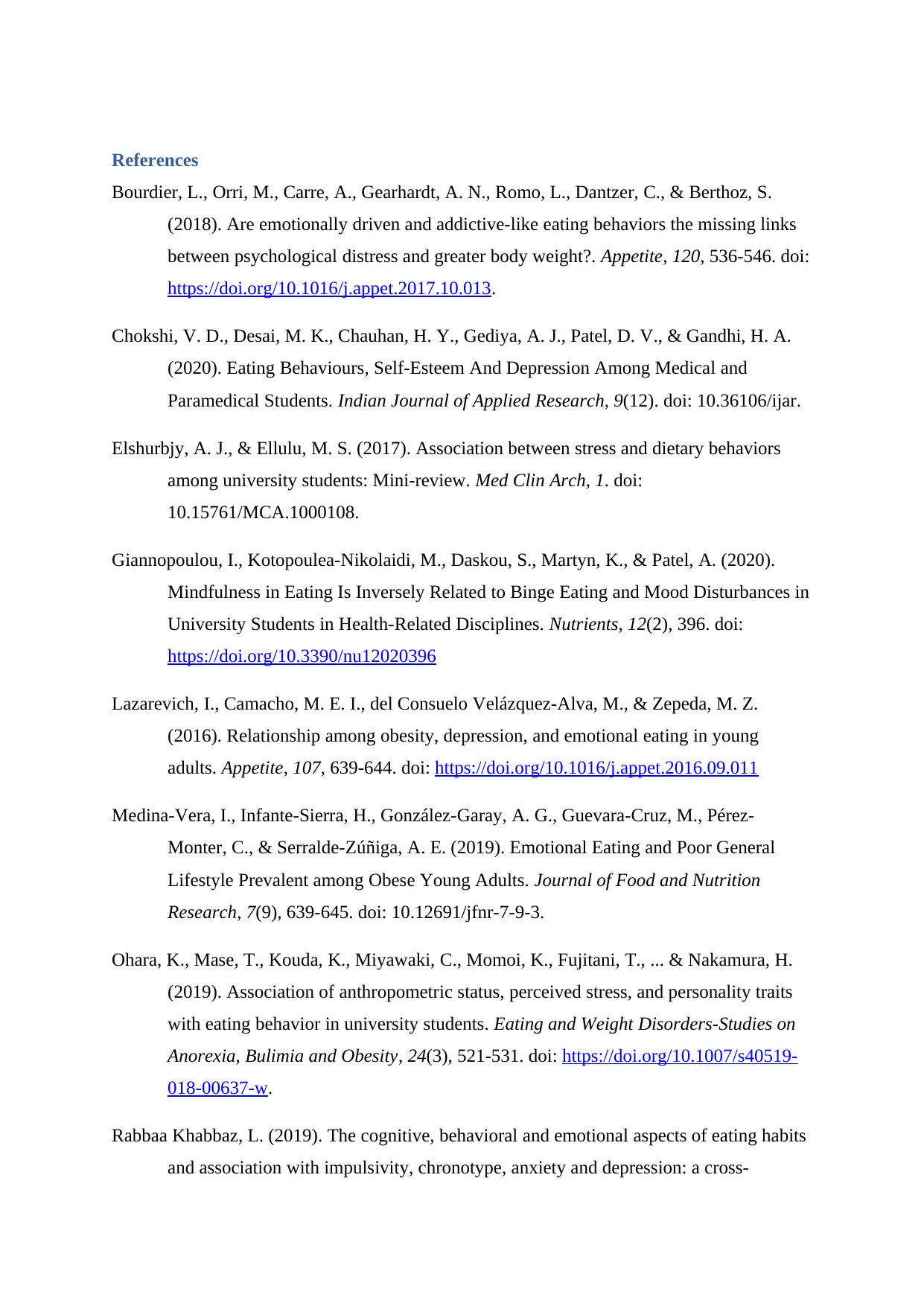
References
Bourdier, L., Orri, M., Carre, A., Gearhardt, A. N., Romo, L., Dantzer, C., & Berthoz, S.
(2018). Are emotionally driven and addictive-like eating behaviors the missing links
between psychological distress and greater body weight?. Appetite, 120, 536-546. doi:
https://doi.org/10.1016/j.appet.2017.10.013.
Chokshi, V. D., Desai, M. K., Chauhan, H. Y., Gediya, A. J., Patel, D. V., & Gandhi, H. A.
(2020). Eating Behaviours, Self-Esteem And Depression Among Medical and
Paramedical Students. Indian Journal of Applied Research, 9(12). doi: 10.36106/ijar.
Elshurbjy, A. J., & Ellulu, M. S. (2017). Association between stress and dietary behaviors
among university students: Mini-review. Med Clin Arch, 1. doi:
10.15761/MCA.1000108.
Giannopoulou, I., Kotopoulea-Nikolaidi, M., Daskou, S., Martyn, K., & Patel, A. (2020).
Mindfulness in Eating Is Inversely Related to Binge Eating and Mood Disturbances in
University Students in Health-Related Disciplines. Nutrients, 12(2), 396. doi:
https://doi.org/10.3390/nu12020396
Lazarevich, I., Camacho, M. E. I., del Consuelo Velázquez-Alva, M., & Zepeda, M. Z.
(2016). Relationship among obesity, depression, and emotional eating in young
adults. Appetite, 107, 639-644. doi: https://doi.org/10.1016/j.appet.2016.09.011
Medina-Vera, I., Infante-Sierra, H., González-Garay, A. G., Guevara-Cruz, M., Pérez-
Monter, C., & Serralde-Zúñiga, A. E. (2019). Emotional Eating and Poor General
Lifestyle Prevalent among Obese Young Adults. Journal of Food and Nutrition
Research, 7(9), 639-645. doi: 10.12691/jfnr-7-9-3.
Ohara, K., Mase, T., Kouda, K., Miyawaki, C., Momoi, K., Fujitani, T., ... & Nakamura, H.
(2019). Association of anthropometric status, perceived stress, and personality traits
with eating behavior in university students. Eating and Weight Disorders-Studies on
Anorexia, Bulimia and Obesity, 24(3), 521-531. doi: https://doi.org/10.1007/s40519-
018-00637-w.
Rabbaa Khabbaz, L. (2019). The cognitive, behavioral and emotional aspects of eating habits
and association with impulsivity, chronotype, anxiety and depression: a cross-
Bourdier, L., Orri, M., Carre, A., Gearhardt, A. N., Romo, L., Dantzer, C., & Berthoz, S.
(2018). Are emotionally driven and addictive-like eating behaviors the missing links
between psychological distress and greater body weight?. Appetite, 120, 536-546. doi:
https://doi.org/10.1016/j.appet.2017.10.013.
Chokshi, V. D., Desai, M. K., Chauhan, H. Y., Gediya, A. J., Patel, D. V., & Gandhi, H. A.
(2020). Eating Behaviours, Self-Esteem And Depression Among Medical and
Paramedical Students. Indian Journal of Applied Research, 9(12). doi: 10.36106/ijar.
Elshurbjy, A. J., & Ellulu, M. S. (2017). Association between stress and dietary behaviors
among university students: Mini-review. Med Clin Arch, 1. doi:
10.15761/MCA.1000108.
Giannopoulou, I., Kotopoulea-Nikolaidi, M., Daskou, S., Martyn, K., & Patel, A. (2020).
Mindfulness in Eating Is Inversely Related to Binge Eating and Mood Disturbances in
University Students in Health-Related Disciplines. Nutrients, 12(2), 396. doi:
https://doi.org/10.3390/nu12020396
Lazarevich, I., Camacho, M. E. I., del Consuelo Velázquez-Alva, M., & Zepeda, M. Z.
(2016). Relationship among obesity, depression, and emotional eating in young
adults. Appetite, 107, 639-644. doi: https://doi.org/10.1016/j.appet.2016.09.011
Medina-Vera, I., Infante-Sierra, H., González-Garay, A. G., Guevara-Cruz, M., Pérez-
Monter, C., & Serralde-Zúñiga, A. E. (2019). Emotional Eating and Poor General
Lifestyle Prevalent among Obese Young Adults. Journal of Food and Nutrition
Research, 7(9), 639-645. doi: 10.12691/jfnr-7-9-3.
Ohara, K., Mase, T., Kouda, K., Miyawaki, C., Momoi, K., Fujitani, T., ... & Nakamura, H.
(2019). Association of anthropometric status, perceived stress, and personality traits
with eating behavior in university students. Eating and Weight Disorders-Studies on
Anorexia, Bulimia and Obesity, 24(3), 521-531. doi: https://doi.org/10.1007/s40519-
018-00637-w.
Rabbaa Khabbaz, L. (2019). The cognitive, behavioral and emotional aspects of eating habits
and association with impulsivity, chronotype, anxiety and depression: a cross-
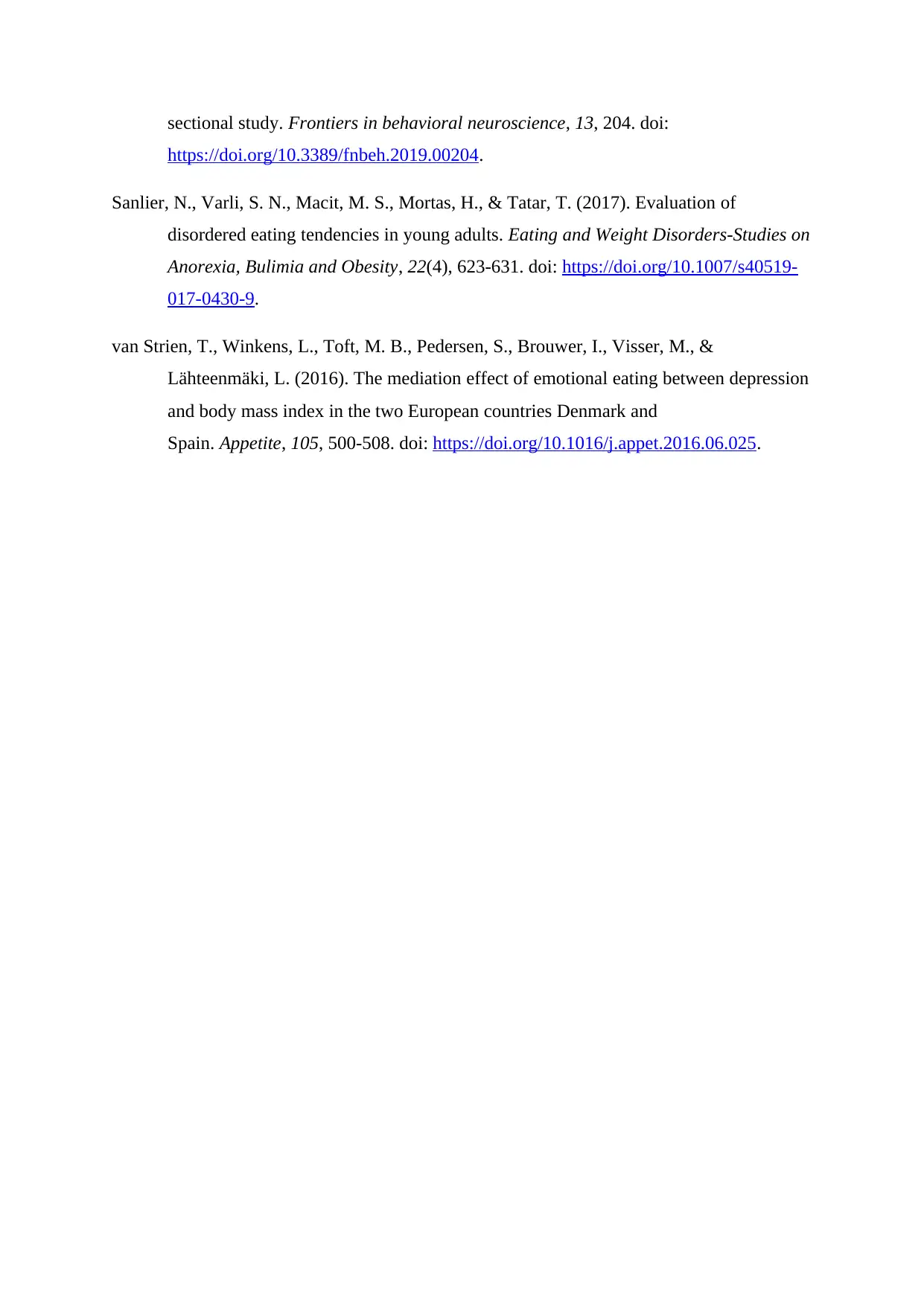
sectional study. Frontiers in behavioral neuroscience, 13, 204. doi:
https://doi.org/10.3389/fnbeh.2019.00204.
Sanlier, N., Varli, S. N., Macit, M. S., Mortas, H., & Tatar, T. (2017). Evaluation of
disordered eating tendencies in young adults. Eating and Weight Disorders-Studies on
Anorexia, Bulimia and Obesity, 22(4), 623-631. doi: https://doi.org/10.1007/s40519-
017-0430-9.
van Strien, T., Winkens, L., Toft, M. B., Pedersen, S., Brouwer, I., Visser, M., &
Lähteenmäki, L. (2016). The mediation effect of emotional eating between depression
and body mass index in the two European countries Denmark and
Spain. Appetite, 105, 500-508. doi: https://doi.org/10.1016/j.appet.2016.06.025.
https://doi.org/10.3389/fnbeh.2019.00204.
Sanlier, N., Varli, S. N., Macit, M. S., Mortas, H., & Tatar, T. (2017). Evaluation of
disordered eating tendencies in young adults. Eating and Weight Disorders-Studies on
Anorexia, Bulimia and Obesity, 22(4), 623-631. doi: https://doi.org/10.1007/s40519-
017-0430-9.
van Strien, T., Winkens, L., Toft, M. B., Pedersen, S., Brouwer, I., Visser, M., &
Lähteenmäki, L. (2016). The mediation effect of emotional eating between depression
and body mass index in the two European countries Denmark and
Spain. Appetite, 105, 500-508. doi: https://doi.org/10.1016/j.appet.2016.06.025.
⊘ This is a preview!⊘
Do you want full access?
Subscribe today to unlock all pages.

Trusted by 1+ million students worldwide
1 out of 9
Related Documents
Your All-in-One AI-Powered Toolkit for Academic Success.
+13062052269
info@desklib.com
Available 24*7 on WhatsApp / Email
![[object Object]](/_next/static/media/star-bottom.7253800d.svg)
Unlock your academic potential
Copyright © 2020–2026 A2Z Services. All Rights Reserved. Developed and managed by ZUCOL.





